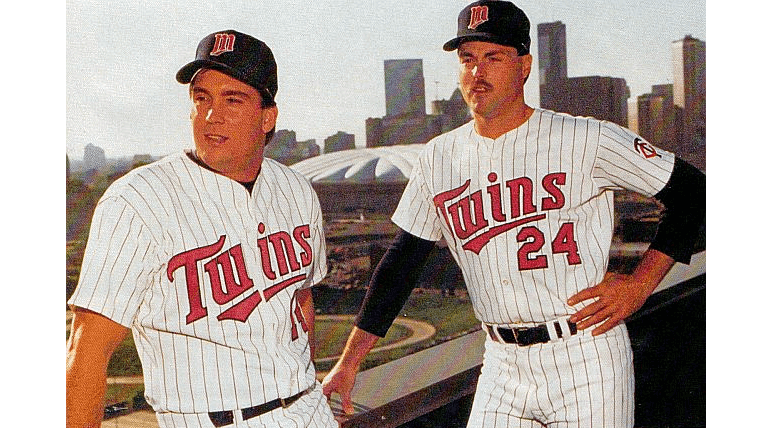CALIFORNIA 7, MINNESOTA 3 IN MINNESOTA
Date: Thursday, April 23.
Batting stars: Gary Gaetti was 1-for-4 with a two-run homer, his fourth. Kent Hrbek was 2-for-4. Steve Lombardozzi was 1-for-3 with a walk.
Pitching stars: None.
Opposition stars: Wally Joyner was 2-for-4 with a home run (his third) and a walk, scoring twice. Devon White was 1-for-3 with a two-run homer, his sixth. Brian Downing was 1-for-5 with a two-run homer, his seventh.
The game: Gaetti's two-run homer in the first made it 2-0 and an error in the fifth put the Twins up 3-2, but it was all downhill after that. In the sixth, Joyner's homer tied it and an RBI single by Darrell Miller made it 4-3 Angels. A three-run ninth made it 7-3. The Twins didn't give up, loading the bases with none out in the bottom of the ninth, but Mark Salas popped up, Randy Bush struck out, and Dan Gladden flied out to end the game.
Of note: Gladden went 0-for-5 to drop his average to .314...Kirby Puckett was 0-for-4 with a run. It was his fourth consecutive oh-fer and dropped his average to .328...Frank Viola started and pitched 7.1 innings, but allowed four runs on seven hits and a walk with six strikeouts. John Candelaria was the California started. He worked seven innings and gave up three runs (one earned) on four hits and a walk with six strikeouts.
Record: The Twins record was 10-6, dropping them into a first-place tie with the Angels.
Notes: Newman started at shortstop in this game, with Greg Gagne going to the bench...Tim Laudner was the DH, replacing Roy Smalley...When I saw that the go-ahead run was knocked in by "D. Miller", I wondered who in the world that was. I kind of remember the name "Darrell Miller', but did not remember a thing about him. It turns out he's the older brother of Cheryl Miller and Reggie Miller. He spent his entire major league career with the Angels, getting drafted in the ninth round in 1979. He started out as a catcher, moving to the outfield in 1981. He reached the majors in mid-August of 1984 after an excellent season in AAA Edmonton. He spent almost all of 1985 with the Angels but rarely played, appearing in fifty-one games but making only five starts. Granted that they had Brian Downing, Gary Pettis, and Reggie Jackson in the outfield, but you can't find more than five starts for a guy who hit .326 with a .937 OPS in AAA? He did well in his limited playing time, batting .375 in 1985, but it did him no good. He was with California for half of 1986, starting a grand total of six games. He continued to hit well in AAA. 1987 was his only full season in the majors, but he got only 108 at-bats and started twelve games. In 1988 they moved him back to catcher and he played a little more, but not much. The Angels let him go after that season. He was in AAA with the Yankees in 1989 and with Baltimore and Seattle in 1990. There could be reasons the Angels didn't think he would succeed--they may have thought his AAA numbers were inflated by playing in the Pacific Coast League, and he may have been a poor defensive player (although, other than Pettis and Devon White, these Angels teams did not exactly have a gold glove outfield). Still, it looks like Gene Mauch unfairly buried him on the bench without ever giving him a chance to see if he could play, and that's too bad. According to wikipedia, he is now major league baseball's vice-president of Youth and Facility Development.


Other than the comment about the Angels' poor outfield defense, this is tangential to the story about Donnie Miller above (which I did not know, so thank you, Chaps), but the other day I found myself wondering about how the Angels might have fared had Lyman Bostock not been in Gary on 24 September 1978.
Lyman signed a five-year deal with California going into '78, which was his age-27 season. At that time the Angels' outfield configuration was Joe Rudi in left, Rick Miller (not the SCOTS front man) in center, and Lyman in right. Ken Landreaux was the fourth outfielder, and Don Baylor, who was usually the DH, played the occasional game in left. In '83, the last year of Lyman's contract, the outfield configuration was Brian Downing in left, Fred Lynn in center, and Ellis Valentine in right.
Landreaux came to the Twins in the Rod Carew trade in February of 1979. Rudi and Miller both stayed with the Angels through 1980, Baylor through 1982. Rudi was traded (along with Frank Tanana & Jim Dorsey) to Boston for Fred Lynn & Steve Reno in January '81. Brian Downing came to the Angels in 1978 and spent his first two seasons there as the primary catcher (he was out most of 1980 with a broken ankle), then moved into left starting in 1981. He didn't become a free agent until 1986, though b-ref is missing contract details for '79-'84, meaning he might've signed an extension somewhere in there. Reggie Jackson signed a five year deal with the Angels in January '82. Gary Pettis was a rookie in '82. Valentine signed a free agent deal in '83.
The pivotal years, I think, are 1979 & 1982. The Angels lost the ALCS both times, to a fairly superior '79 Orioles squad, and in a pretty even matchup with the "Harvey's Wallbangers" Brewers team in '82. Dan Ford was the primary right fielder in '79, and with a 117 OPS+ there is room for Lyman to have made a difference, but not enough for the 88-win Angels to overcome the 102-win Orioles. Nor was there really room to move Disco Dan anywhere else; Baylor posted a 145 OPS+ in left, and Willie Aikens put up a 137 OPS+ as the primary DH.
In 1982, however, there would've been a huge roster crunch. Assuming the Angels still trade for Fred Lynn in 1981 (and I think they do – he was going into his age-29 season, while Pettis wasn't ready), then they would've needed to find playing time for Downing, Lynn, Baylor, Reggie, and Juan Beníquez. Maybe they don't sign Reggie and upgrade their pitching instead. Or maybe they don't trade Tanana for Lynn and get creative with their outfield alignment. That's a hard counterfactual.
The Angels fell to 70-92 in 1983. Reggie, who was 37, had a terrible year (74 OPS+, but he made the All-Star team!), and Valentine was below league average. I don't think the Angels would've signed Valentine if Lyman was around. The rest of the outfield was aging but productive – Downing was 32, Lynn was 31, Beníquez was 33. Lyman would've been 32. Buzzie Bavasi would've had some hard choices to make about the future of the team and Lyman's place on it, assuming Lyman was still playing well. (He seems the type to have skills that would've aged well.) Pettis finally becomes the primary center fielder in '84, pushing Lynn to right. ( Lynn signed with Baltimore in December '84.) Maybe Bavasi lets Lyman, the local boy-turned-star, go even though his cupboard is a little bare and playing Reggie in the outfield an exercise in futility. Maybe Lyman signs with the Dodgers, who needed some offense and got 278 PA from their primary right fielder. Or maybe, and this is how I like to think of it, Bavasi signs Lyman to an extension. That makes 1985 a whole lot more interesting, because the Angels finished only one game behind the Royals that year.
I love this photo of Hrbie & Bruno with the Dome in the background. It just needs the G-Man to be complete.
B. Downing owned the Twins. Especially games I attended.
He was a career 267/370/425 hitter.
Against the Twins he was 276/381/428 hitter.
The team he owned the most was the Mariners with 296/416/504
I need to find those old scorecards. This one still sticks in my craw.
*browsing the box score*
Oh, hey, look who blew the save...holy crap, a -1.052 WPA?!?!!?
It's takes a special person to lose more than one game in one game.
Yeah, I knew someone would bring that up. This is the game where he finally revealed his true self to me.